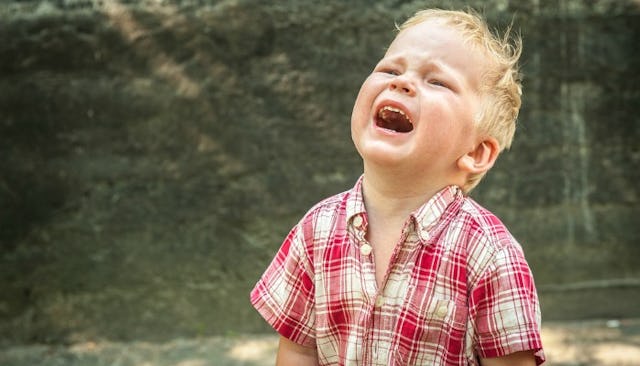Why I Let My Kids Kick And Scream When They're Angry

We feel emotions strongly in this house. I suppose that isn’t abnormal, but it can be very difficult some days when we all feel them at one time or run the entire spectrum in one day. My emotions have been on a roller coaster lately. Perhaps hormones normalizing after having babies or having three toddlers or being tired — there isn’t one simple answer or one simple way to fix it. And that has left me thinking a lot about how I deal with and react to my own feelings.
I get angry quickly and yell — it is not something I like about myself at all. When my feelings get hurt, I feel ashamed and silence myself. During the chaos of the day, stress attacks me easily, and I have a hard time realizing I can stop the stress by saying “no” or altering my plans.
While watching my 2-year-old scream at the top of his lungs, shaking with anger, I realized that I can’t change my emotions with a snap of a finger. Yet I ask my kids to “stop reacting that way” or “change your attitude” without giving them the tools they need to modify their behavior.
I feel justified in my anger when it strikes. I experience disappointment and discontentment. But I can name those emotions; my children can’t. Emotions are a hard thing to measure and explain. They affect us in a variety of ways. Our kids experience the same overwhelming emotions that we do in their little bodies.
The difference is they have minds that aren’t fully developed, vocabularies that aren’t extensive, and experience that hasn’t taught them they will get over it. Isn’t that my job as a mom? To help them experience the emotion, understand it, and explain it? Isn’t it my job to take time to practice self-control, so I can mimic healthy emotional reactions to them?
Yes, motherhood gets a lot more difficult for us if we have to do that, but I absolutely believe we do. We have to help them learn not to bury their emotions, but instead to feel them and experience them truthfully, so they can react appropriately.
Recently, I was sitting with a friend who asked, “What is the purpose?” She was struggling to understand why it was okay for her to be mad at someone if it wasn’t going to change the past or affect the future. I know I do this too. I hide from an emotion, avoid encounters that will be ruined if I admit how I feel. Kids don’t do this though. They feel strongly, and they pull us all into the tornado of their excitement and disappointment just the same. Those big emotions control their small hearts and minds. So often, I hide my emotions when I feel like I am too much to deal with or less-than. It can be easy to discipline our kids’ reactions without allowing them to experience and process their emotions.
But emotions aren’t shameful. They aren’t wrong. They don’t make you dumb or too much to deal with. The only wrong that comes is in our reaction. I can be mad at my husband and express this to him, or I can give him the silent treatment until he understands how hurt I feel. My emotion is the same: anger. But I believe one of those reactions is wrong.
We have a couch where they can scream, and they can throw stuffed animals in their room or lie in their bed and kick the wall. I have a couch in my room where they find me sitting sometimes in tears or prayer or staring at the wall not knowing what to do. We slow down. We name the emotion, and we work to understand why we are feeling it. Not so we can stop it, not so we can hide it the next time, but so we can grow. So that we can experience joy and sadness and excitement and anger. So we can be passionate and feel strongly about things.
I want my children to grow up with an understanding of those big emotions. Those emotions can allow them to change their world instead of the world changing them.